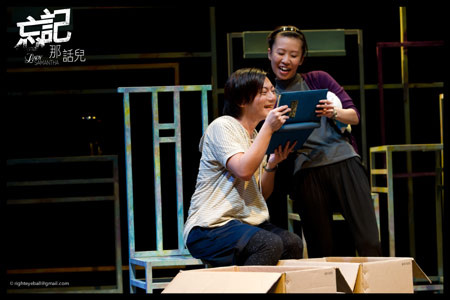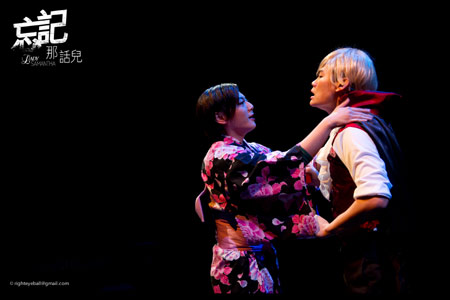If you were allowed one wish, what would it be? Would it be career achievement, perhaps, or finding the dream boyfriend? Pak Li’s latest play, Lady Samantha, explores different kinds of longings and the possibility for redemption through their fulfilment. The play’s main character Sam/Samantha (played by Sam Choy Chak Man) seeks recognition of the feelings he has had all his life: that he is a woman in a man’s body. The play covers the period between Sam’s psychological assessments for gender reassignment to the moment he prepares for surgery and his struggle, not only for official permission to undergo that surgery, but also to cope with the impact his decision has on his relationships with friends and family.

Sam (played by Sam Choy Chak Man) with mother (played by Kwok Chui Yi)
Sam’s mother (played by Kwok Chui Yi), owner of an ailing printing shop, cannot let go of the memory of a husband who has left her for another woman. She vacillates between polite support of Sam’s decision and violent emotional rebuke, her own turmoil culminating in a suicide attempt. Sam’s best friend Leung (the actor Chan Siu Tung) proves mostly supportive and accepting, but is faced with his own dilemmas, in part caused by his friendship. Beleaguered by his fiancée Bella’s pampered and neurotic claims upon him, he is forced to choose between dignity and submission, friendship and love. Though Bella (played by Cheng Cho Man) is also Sam’s friend, she longs for a romantic wedding and as the wedding approaches, she becomes increasingly demanding, stretching the fabric of her relationships to the limit.
The story telling is assisted by director Octavian Chan Cheuk Wai’s clever use of stage design. The set consists of no more than a metal shelf, a metal desk, some metal chairs and some stage-marking tapes. As the play progresses, the props are assembled and disassembled, transforming the centre stage of the black box theatre into a doctor’s office, a printing shop, a hospital, a public park, and a funeral parlour. ‘The constantly assembled and disassembled parts of the set represent fragments of memory, which play a prominent role in the characters’ lives. ‘The coldness of the metal reflects the censure the wider world displays towards transgender people,’ said Pak. The most ingenious use of the stage comes near the end, when Sam prepares to embark on life as a woman, as four characters central to Sam’s life, his mother, his best friend, his psychologist and his ex-boyfriend stand at the four corners of the stage surrounding him. Together, they peel up the stage marking tape, symbolising Sam’s liberation from the prison of his man’s body.

At 30, Pak Li has already written more than 50 plays, most of which have been performed. Many of them focus on situations faced by minorities; before Lady Samantha, he has covered subjects as different as AIDS and sadomasochism.
"Drama in Hong Kong tends to have a narrow focus. How many romance-comedies and family feuds do we want to see? And how many of us really live the upper-middle class lifestyle that is the norm in soap opera? There is certainly room to portray a wider range of characters on stage."
"What is the inspiration for this play?" I asked Pak.
"The idea came to me some years ago, when I saw a play portraying the tragic life of Fei Cheung, a prominent transgender person whose life ended in suicide. Her pursuit of love was so ordinary, and yet she had to pay such an extraordinary price for it. Back then I wanted to write another play that explored the limitations faced by transgender people, albeit with a more positive ending."
Is it difficult for Pak, a gay man, to walk in the shoes of a transgender woman?
"There are some difficulties," he concedes.
"I talked to some transgender friends when I was writing the script, yet when they saw it, some found my portrayal of Sam lacking, although they were not able to pin-point what exactly is missing."
This play is a departure from his last drama, Ropes of Love, which borrowed heavily from the playwright’s own experiences. (Read A life in progress and on view: Hong Kong playwright Pak Li on Fridae.)
"Nevertheless there are some elements in the play that were taken from my own life," he explained.
"For example, Sam’s mother first supports his decision to become a woman and then reverses into angry disapproval. My own mother reacted similarly when I came out to her as gay. Also, the character of Bella is based on a girlfriend, whose intense pursuit of a romantic wedding almost caused her to lose her fiancé."
For his next major production, Pak plans to explore the lives of racial minorities in Hong Kong. His achievements in the theatrical arts seem all the more impressive, when he tells me that his day time job has nothing to do with the arts.

Sam in Kimono with best friend Leung (played by Chan Siu Tung)
"At this moment, it is impossible for me to support myself through art. So I work as a university administrator by day and an artist by night. It is like having two full-time jobs,’ he said. ‘This is far from ideal: artists make slower progress when they are forced to do something totally unrelated. I hope that changes in government policy will allow more artists to support themselves through art."
Despite its unusual topic, Lady Samantha has a wealth of characters with whom many will be able to identify. If I left with anything after watching the play, it is that we should respect the longings of others as much as we cherish our own.
Despite its serious and disturbing themes, the play ends on a positive note. In a strangely comedic moment, Sam’s mother inhales carbon monoxide in her suicide attempt, making her prone to amnesia, forgets that she once had a husband and so can be reconciled with Sam’s becoming a woman. Meanwhile Sam obtains approval from his psychologist to undergo the surgery. The play ends as he dresses as a woman and prepares for the imminent surgery. There is hope for resolution after all, the play reminds us, though it may come in strange and unexpected ways.
Lady Samantha was performed between 14 and 17 April this year at Kwai Tsing Theater in Hong Kong. Pak Li is currently executive director of Metro-Holik Studio, a theatre company founded by himself, Chan Cheuk Wai and Choi Chek Man.











 打印版本
打印版本










读者回应
请先登入再使用此功能。